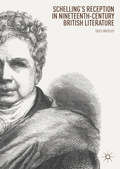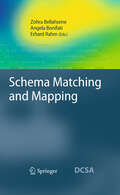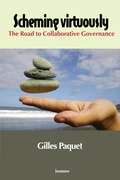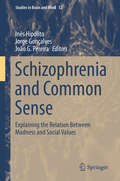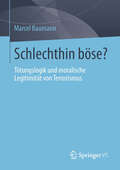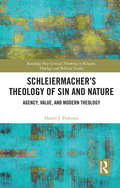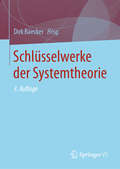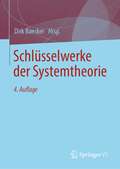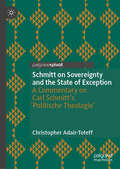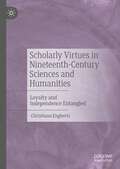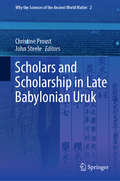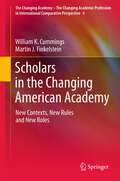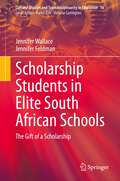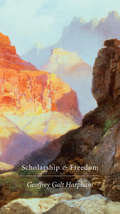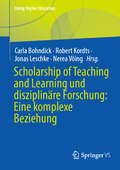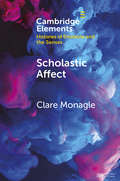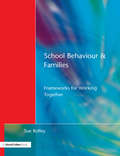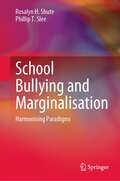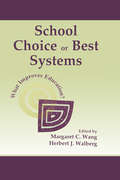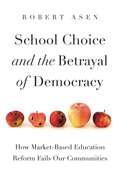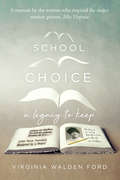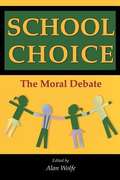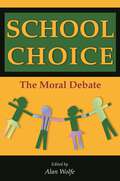- Table View
- List View
Schelling’s Reception in Nineteenth-Century British Literature
by Giles WhiteleyThis book examines the various ways in which the German philosopher Friedrich Schelling was read and responded to by British readers and writers during the nineteenth century. Challenging the idea that Schelling’s reception was limited to the Romantics, this book shows the ways in which his thought continued to be engaged with across the whole period. It follows Schelling’s reception both chronologically and conceptually as it developed in a number of different disciplines in British aesthetics, literature, philosophy, science and theology. What emerges is a vibrant new history of the period, showing the important role played by reading and responding to Schelling, either directly or more diffusely, and taking in a vast array of major thinkers during the period. This book, which will be of interest not only to historians of philosophy and the history of ideas, but to all those dealing with Anglo-German reception during the nineteenth century, reveals Schelling to be a kind of uncanny presence underwriting British thought.
Schema Matching and Mapping
by Erhard Rahm Angela Bonifati Zohra BellahseneSchema Matching and Mapping provides an overview of the ways in which the schema and ontology matching and mapping tools have addressed information systems requirements. Topics include effective methods for matching data, mapping transformation verification, mapping-driven schema evolution and merging.
Scheming Virtuously: The Road to Collaborative Governance
by Gilles PaquetScheming Virtuously: The Road to Collaborative Governance is an invitation to subversion, but also a somewhat personal account of the displacement of the dominant governing regime (Big-G centralized government) by small-g collaborative governance, in a world where power, resources, and information are widely distributed. In this new world, the citizen’s burden of office is clear: to be a producer of governance. Scheming virtuously is the order of the day—active engagement, imaginative problem-reframing, astute organizational design, and effective action within the bounds of the appreciative systems in good currency and beyond.
Schizophrenia and Common Sense: Explaining the Relation Between Madness and Social Values (Studies in Brain and Mind #12)
by Inês Hipólito Jorge Gonçalves João G. PereiraThis book explores the relationship between schizophrenia and common sense. It approaches this theme from a multidisciplinary perspective. Coverage features contributions from phenomenology, cognitive neuroscience, philosophy of mind, psychology, and social cognition. The contributors address the following questions: How relevant is the loss of common sense in schizophrenia? How can the study of schizophrenia contribute to the study of common sense? How to understand and explain this loss of common sense? They also consider: What is the relationship of practical reasoning and logical formal reasoning with schizophrenia? What is the relationship between the person with a diagnosis of schizophrenia and social values? Chapters examine such issues as rationality, emotions, self, and delusion. In addition, one looks at brain structure and neurotransmission. Others explore phenomenological and Wittgensteinian theories. The book features papers from the Schizophrenia and Common Sense International Workshop, held at New University of Lisbon, November 2015. It offers new insights into this topic and will appeal to researchers, students, as well as interested general readers.
Schlechthin böse?: Tötungslogik und moralische Legitimität von Terrorismus
by Marcel BaumannGlobale Phänomene wie politische Gewalt oder Terrorismus zu verstehen, ist eine große Herausforderung. Dieses Buch leistet hierzu einen Beitrag, indem die Problematik der Legitimität und Legitimation von Gewalt in den Mittelpunkt gestellt wird. Die Frage, unter welchen Bedingungen Gewalt legitim ist, wird aus der Perspektive der Gewaltakteure gestellt. Denn Legitimität ist keine für immer garantierte Eigenschaft, sondern sie muss stets aufs Neue geschaffen werden. Deshalb müssen sich "Terroristen" permanent der legitimitätssuchenden Selbstverständigung stellen: die Rechtfertigung des eigenen Gewalthandelns in den Augen der Gemeinschaft. Die Analyse möchte dazu beitragen, politische Gewalt anders sehen zu lernen. Sie ist interdisziplinär angelegt, indem sie Politische Philosophie, verstehende Soziologie und Moralphilosophie integriert.
Schleiermacher’s Theology of Sin and Nature: Agency, Value, and Modern Theology (Routledge New Critical Thinking in Religion, Theology and Biblical Studies)
by Daniel J. PedersenFriedrich Schleiermacher (1768-1834) is often considered the Father of Modern Theology, known for his attempt to reconcile traditional Christian doctrines with philosophical criticisms and scientific discoveries. Despite the influence of his work on significant figures like Karl Barth, he has been largely ignored by contemporary theologians. Focussing on Schleiermacher’s doctrine of sin, this book demonstrates how Schleiermacher has not only been misinterpreted, but also underestimated, and deserves a critical re-examination. The book approaches Schleiermacher on sin with respect to three themes: one, its power to transcend an intractable metaethical dilemma at the heart of modern debates over sin; two, its intended compatibility with natural science; and three, to re-evaluating its place, and so Schleiermacher’s place, in the history of theology. It solves and dissolves problems arising simultaneously from natural science, confessional theology, ethics, and metaphysics in a single, integrated account using Schleiermacher’s understudied thought from his dogmatics The Christian Faith. In contrast to the account sometimes given of modern theology as marked by a break with "Greek metaphysics," Schleiermacher’s account is shown to stand in stark contrast by retrieving, not excising, ancient thought in service of an account of sin adequate to natural science. This is a vital rediscovery of a foundational voice in theology. As such, it will greatly appeal to scholars of Modern Theology, theological ethics, and the history of Modern Christianity.
Schlüsseltexte der ‚Neuen Rechten‘: Kritische Analysen antidemokratischen Denkens (Edition Rechtsextremismus)
by David MeieringMit Begriffen, Bildern und Theorien arbeitet die ‚Neue Rechte‘ an der kulturellen Hegemonie. Ihre Diskursarbeit inszenieren sie als gefährliches, dunkles Denken. Der vorliegende Band entmystifiziert diese Selbstdarstellung, indem er ihre ‚Schlüsseltexte‘ kritisch liest, dechiffriert und in den Kontext antidemokratischen und menschenfeindlichen Denkens einordnet. Als analytische Miniaturen zeigen die Beitrage das diskursive Handwerk und die argumentative Architektur der ‚Neuen Rechten‘ auf. So gelingt Aufklärung über ‚neurechte‘ Strategien in Schulen, Universitäten und in der Öffentlichkeit.
Schlüsselwerke der Systemtheorie
by Dirk BaeckerDie Systemtheorie ist ein Versuch, Beschreibungen für Phänomene zu finden, die weder so einfach sind, dass sie kausal, noch so zufällig, dass sie statistisch beschrieben werden können. In der Systemtheorie geht es um Phänomene der Selbstorganisation und um die Frage, wie der Beobachter mit einer Begrifflichkeit ausgestattet werden kann, die es ihm erlaubt, zu begreifen, dass er mit seinen Beschreibungen ein Teil der Welt ist und nicht in einem unbestimmten Außerhalb agiert.
Schlüsselwerke der Systemtheorie
by Dirk BaeckerDie Systemtheorie ist ein Versuch, Beschreibungen für Phänomene zu finden, die weder so einfach sind, dass sie kausal, noch so zufällig, dass sie statistisch beschrieben werden können. In der Systemtheorie geht es um Phänomene der Selbstorganisation und um die Frage, wie der Beobachter mit einer Begrifflichkeit ausgestattet werden kann, die es ihm erlaubt, zu begreifen, dass er mit seinen Beschreibungen ein Teil der Welt ist und nicht in einem unbestimmten Außerhalb agiert.
Schmitt on Sovereignty and the State of Exception: A Commentary on Carl Schmitt's 'Politische Theologie' (Palgrave Studies in Classical Liberalism)
by Christopher Adair-ToteffThis Palgrave Pivot offers a balanced and impartial commentary on one of the most important of the early writings by the German legal scholar Carl Schmitt. The book is known mostly by its title Politische Theologie but Schmitt&’s subtitle indicated that his book was on more than political theology, but was focused on conceptions of sovereignty, authority, and the &‘state of exception&’. The author shows how the Politische Theologie published in 1922 clearly formulated Schmitt&’s thinking regarding decisionism, dictatorship, and sovereignty, and how these notions intertwined to propose a governmental model opposed to parliamentary democracy. The book illuminates Carl Schmitt&’s role in theorising the &‘state of exception&’ as he engaged in debates with those who contended that democratic principles were crucial. Schmitt insisted there needs to be a sovereign individual whose authority provides an immediate decision to the &‘state of exception.&’ This book will be of interest to scholars of legal and political philosophy, as well as those interested broadly in ideas of classical liberalism, wartime political economy, authoritarianism and socio-economic influences on legal thinking.
Scholarly Virtues in Nineteenth-Century Sciences and Humanities: Loyalty and Independence Entangled
by Christiaan EngbertsReflecting a growing interest in the history of knowledge, this book explores the importance of scholarly virtues during the late nineteenth century. The practice of science is moulded on notions of scholarly values, such as diligence, impartiality, meticulousness and patience, but here, the author focuses on the virtues of collegial loyalty and critical independence. By analysing how virtues were reflected in day-to-day scholarly work, and examining the possibility that these virtues may have come into conflict with each other, this book sheds light on what is often described as ‘the moral economy of scholarship,’ a metaphor which draws attention to the changeability of the expectations raised by virtue. Highlighting the pre-eminence and exemplary nature of German scholarship during the nineteenth century, the author provides a detailed analysis of four evaluative practices used by scholars across the humanities, social sciences and natural sciences in a number of German universities.This allows a nuanced understanding of the complex relationship between collegial loyalty and critical independence in the academic working environment, and draws comparisons across varying disciplines. A welcome contribution to a growing field of research, this book provides a comparative and transdisciplinary overview of scholarly virtues and will be of interest to those researching the history of science and the humanities.
Scholars and Scholarship in Late Babylonian Uruk (Why the Sciences of the Ancient World Matter #2)
by Christine Proust John SteeleThis volume explores how scholars wrote, preserved, circulated, and read knowledge in ancient Mesopotamia. It offers an exercise in micro-history that provides a case study for attempting to understand the relationship between scholars and scholarship during this time of great innovation. The papers in this collection focus on tablets written in the city of Uruk in southern Babylonia. These archives come from two different scholarly contexts. One is a private residence inhabited during successive phases by two families of priests who were experts in ritual and medicine. The other is the most important temple in Uruk during the late Achemenid and Hellenistic periods. The contributors undertake detailed studies of this material to explore the scholarly practices of individuals, the connection between different scholarly genres, and the exchange of knowledge between scholars in the city and scholars in other parts of Babylonia and the Greek world. In addition, this collection examines the archives in which the texts were found and the scribes who owned or wrote them. It also considers the interconnections between different genres of knowledge and the range of activities of individual scribes. In doing so, it answers questions of interest not only for the study of Babylonian scholarship but also for the study of ancient Mesopotamian textual culture more generally, and for the study of traditions of written knowledge in the ancient world.
Scholars in the Changing American Academy
by Martin J. Finkelstein William K. CummingsAs the nature of education generally, and higher education in particular, changes irrevocably, it is crucial to understand the informed opinions of those closest to the institutions of learning. This book, based on a survey of academics in 19 nations and conducted by leading global scholars, is a thorough sounding of the attitudes of academics to their working environment. As the post-WWII liberal consensus crumbles, higher education is increasingly viewed as a private and personal investment in individual social mobility rather than as a public good and, ipso facto, a responsibility of public authorities. The incursion of corporate culture into academe, with its 'stakeholders', 'performance pay' and obsession with 'competitiveness' is a matter of bitter debate, with some arguing that short-termism is obviating epoch-making research which by definition requires patience and persistence in the face of the risk of failure. This book highlights these and many other key issues facing the academic profession in the US and around the world at the beginning of the 21st century and examines the issues from the perspective of those who are at the front line of change. This group has numerous concerns, not least in the US, where government priorities are shifting with growing budget pressures to core activities such as basic education, health and welfare. Drawing too on comparable surveys conducted in 1992, the book charts the actual contours of change as reflected in the opinions of academics. Critically, the volume explicitly compares and contrasts the situation of American academics with that of academics in other advanced and developing economies. Such an assessment is critical both for Americans to chart the future of their indigenous tertiary enterprise, but also for shaping the response of the nations around the world who contemplate applying the American model to their own national systems.
Scholarship Students in Elite South African Schools: The Gift of a Scholarship (Cultural Studies and Transdisciplinarity in Education #16)
by Jennifer Wallace Jennifer FeldmanThis book provides a narrative account of the experiences of twenty former scholarship students from historically disadvantaged communities who attended elite public and private secondary schools. It draws on in-depth, one-on-one semi-structured interviews conducted with former scholarship recipients who were between the ages of 19 and 24 years at the time of the interviews. Various themes are explored, specifically focusing on elite schooling in relation to the experiences and navigational practices of the scholarship recipients and the adjustments that they felt they needed to make in order to fit into the elite school space.The book analyses and discusses the reflective experiences of students who were awarded a scholarship to attend an elite secondary school. It reveals that accepting the gift of a scholarship is far more complex, multi-layered, and at times harsh and even painful for the individual recipients than is possibly realized by those involved in this practice. This book contributes to academic educational debates within the sociology of education, elite schools and schooling in the post-apartheid South African context.
Scholarship and Freedom
by Geoffrey Galt HarphamA powerful and original argument that the practice of scholarship is grounded in the concept of radical freedom, beginning with the freedoms of inquiry, thought, and expression. Why are scholars and scholarship invariably distrusted and attacked by authoritarian regimes? Geoffrey Galt Harpham argues that at its core, scholarship is informed by an emancipatory agenda based on a permanent openness to the new, an unlimited responsiveness to evidence, and a commitment to conversion. At the same time, however, scholarship involves its own forms of authority. As a worldly practice, it is a struggle for dominance without end as scholars try to disprove the claims of others, establish new versions of the truth, and seek disciples. Scholarship and Freedom threads its general arguments through examinations of the careers of three scholars: W. E. B. Du Bois, who serves as an example of scholarly character formation; South African Bernard Lategan, whose New Testament studies became entangled on both sides of his country’s battles over apartheid; and Linda Nochlin, whose essay “Why Have There Been No Great Women Artists?” virtually created the field of feminist art history.
Scholarship of Teaching and Learning und disziplinäre Forschung: Eine komplexe Beziehung (Doing Higher Education)
by Nerea Vöing Carla Bohndick Jonas Leschke Robert KordtsIn der Nachfolge Boyers (1990) und anderer Autor:innen im englischsprachigen Raum hat sich Scholarship of Teaching and Learning (SoTL) auch im deutschsprachigen Raum nicht als fachspezifische Forschung (Boyer: Scholarship of Discovery), sondern als systematische Erkundung (inquiry) der zumeist eigenen Lehre und des studentischen Lernens durch Hochschullehrende entwickelt. Dabei sind die Abgrenzungen zwischen den beiden Konzepten Forschung und SoTL allerdings weder konzeptionell noch konkret geklärt. Es stellen sich Fragen wie: Ist SoTL Forschung und wenn ja, ab wann? Mit welchen Methoden und Ansätzen wird SoTL durchgeführt? Welche fachspezifischen, nicht sozialwissenschaftlichen, Methoden oder Ansätze für SoTL gibt es? Dieser Band exploriert diese und andere Fragen zum einen aus der Perspektive von Lehrenden, die selbst in SoTL aktiv sind, zum anderen aus einer allgemeineren bildungswissenschaftlichen und hochschuldidaktischen Perspektive.
Scholastic Affect: Gender, Maternity and the History of Emotions (Elements in Histories of Emotions and the Senses)
by Clare MonagleScholastic theologians made the Virgin Mary increasingly perfect over the Middle Ages in Europe. Mary became stainless, offering an impossible but ideologically useful vision of womanhood. This work offers an implicit theory of the utility and feelings of women in a Christian salvationary economy. The Virgin was put to use as a shaming technology, one that silenced and effaced women's affective lives. The shame still stands to this day, although in secularised mutated forms. This Element deploys the intellectual history of medieval thought to map the moves made in codifying Mary's perfection. It then uses contemporary gender and affect theory to consider the implications of Mary's perfection within modernity, mapping the emotional regimes of the medieval past upon the present.
School Behaviour and Families: Frameworks for Working Together
by Sue RoffeyThis book focuses on the relationship that schools have with parents and carers, especially in the early stages of behavioral difficulty. It aims to promote the best possible partnership with parents in what is often a sensitive and emotionally fraught situation. It contains an overview of the context and a general theoretical framework for home school interactions on behavior; research findings on factors which facilitate or inhibit effective partnerships, helping teachers understand why some parents/carers are reluctant to become involved or may appear aggressive and suggests ways in which schools might usefully respond; and chapters written by contributors with specific expertise in working with parents who have harmed their children, the carers of children in foster families and residential homes, mobile families (including travelers and asylum seekers), and families from diverse communities. The book is intended primarily for teachers and school managers at every phase of education, but will also be of interest to educational psychologists, home-school liaison officers, support staff, counselors, mentors, LEA officers and anyone working in parent partnership schemes.
School Bullying and Marginalisation: Harmonising Paradigms
by Phillip T. Slee Rosalyn H. ShuteThis book addresses, and seeks to harmonise, different paradigms for understanding school bullying. It sets out to examine two paradigms for conceptualising bullying, and the worldviews that underpin them. It uses a complex systems perspective to bring the two paradigms together in a holistic fashion. By doing so, it creates an integrated framework for conceptualising the many individual, relational and societal factors that are in dynamic interaction and play a part in promoting or reducing school bullying. This book draws upon a number of disciplines by way of background, including evolutionary, child development and social psychological theories of group behaviour and identity. It proposes that the human need for belonging is central to understanding bullying, and situates the topic within an understanding of gender and children’s human rights, bringing philosophical and moral perspectives to bear. It discusses practical ways forward, presents a systemic approach to bullying and application of complex adaptive systems methods to bullying research and evaluation. It serves as an introduction to such methods and suggests further creative ideas for policy, intervention practice, and teacher education about bullying.
School Choice Or Best Systems: What Improves Education?
by Herbert J. Walberg Margaret C. WangThis book addresses one of the most urgent questions in American society today, one that is currently in the spotlight and hotly debated on all sides: Who shall rule the schools--parents or educators? School Choice or Best Systems: What Improves Education? presents an overview of research and practical applications of innovative--even radical--school reforms being implemented across the United States. These fall along a continuum ranging from "parental choice" to "best systems." At the one extreme are schools of choice, which allow parents to choose and even govern schools for their children. These include charter schools, traditional private and parochial schools, schools that are privately governed but publicly funded through vouchers, and those that are funded by private scholarships provided by both corporations and wealthy individuals. At the other extreme are centralized state or district systems, based on reform initiatives and new systems of education that have been developed in response to views of citizens and legislators that schools can do much better. These schools, which specify uniform goals, policies, and programs for each school, are highly innovative systems based on research or representing advanced thinking about "what works," and have attracted wide interest. Important questions related to schools of choice and best systems are addressed: How can we choose among schools of choice and best systems? Among the various approaches within each of these alternatives? How can we understand their guiding principles and operational practices? What results do they produce? How can we evaluate their claims? In choosing among the alternatives, how should issues of student achievement, accountability, costs, feasibility, and equity be factored in? This volume brings together leading researchers and education leaders who have carried out the latest studies and advances in the field, providing a forum for them to set forth the arguments and evidence that will be most helpful in making choices for tomorrow's schools. It does not provide a single "right" answer--values and preferences differ across parents, schools, districts, and states. However, there are benefits for all from seeing the rigorous research, challenging thinking, and alternate points of view this volume presents.
School Choice and the Betrayal of Democracy: How Market-Based Education Reform Fails Our Communities (Rhetoric and Democratic Deliberation #26)
by Robert AsenEvidence shows that the increasing privatization of K–12 education siphons resources away from public schools, resulting in poorer learning conditions, underpaid teachers, and greater inequality. But, as Robert Asen reveals here, the damage that market-based education reform inflicts on society runs much deeper. At their core, these efforts are antidemocratic.Arguing that democratic communities and public education need one another, Asen examines the theory driving privatization, popularized in the neoliberalism of Milton and Rose Friedman, as well as the case for school choice promoted by former secretary of education Betsy DeVos and the controversial voucher program of former Wisconsin governor Scott Walker. What Asen finds is that a market-based approach holds not just a different view of distributing education but a different vision of society. When the values of the market—choice, competition, and self-interest—shape national education, that policy produces individuals, Asen contends, with no connections to community and no obligations to one another. The result is a society at odds with democracy.Probing and thought-provoking, School Choice and the Betrayal of Democracy features interviews with local, on-the-ground advocates for public education and offers a countering vision of democratic education—one oriented toward civic relationships, community, and equality. This book is essential reading for policymakers, advocates of public education, citizens, and researchers.
School Choice and the Betrayal of Democracy: How Market-Based Education Reform Fails Our Communities (Rhetoric and Democratic Deliberation)
by Robert AsenEvidence shows that the increasing privatization of K–12 education siphons resources away from public schools, resulting in poorer learning conditions, underpaid teachers, and greater inequality. But, as Robert Asen reveals here, the damage that market-based education reform inflicts on society runs much deeper. At their core, these efforts are antidemocratic.Arguing that democratic communities and public education need one another, Asen examines the theory driving privatization, popularized in the neoliberalism of Milton and Rose Friedman, as well as the case for school choice promoted by former secretary of education Betsy DeVos and the controversial voucher program of former Wisconsin governor Scott Walker. What Asen finds is that a market-based approach holds not just a different view of distributing education but a different vision of society. When the values of the market—choice, competition, and self-interest—shape national education, that policy produces individuals, Asen contends, with no connections to community and no obligations to one another. The result is a society at odds with democracy.Probing and thought-provoking, School Choice and the Betrayal of Democracy features interviews with local, on-the-ground advocates for public education and offers a countering vision of democratic education—one oriented toward civic relationships, community, and equality. This book is essential reading for policymakers, advocates of public education, citizens, and researchers.
School Choice: A Legacy to Keep
by Virginia Walden FordOn a cold winter night in February of 1967, a large rock shattered a bedroom window in Virginia Walden Ford's home in Little Rock, Arkansas, landing in her baby sister's crib. Outside, members of the Ku Klux Klan burned a cross on her family's lawn. Faceless bigots were terrorizing Virginia, her parents, and her sisters–all because her father, Harry Fowler, dared to take a job as the assistant superintendent of personnel for the Little Rock School District. He was more than qualified, but he was black.In her searing new memoir, legendary school choice advocate Virginia Walden Ford recounts the lessons she learned as a child in the segregated south. She drew on those experiences—and the legacies handed to her by her parents and ancestors—thirty years later, when she built an army of parents to fight for school choice in our nation's capital. School Choice: A Legacy to Keep, tells the dramatic true story of how poor D.C. parents, with the support of unlikely allies, faced off against some of America's most prominent politicians—and won a better future for children.
School Choice: The Moral Debate
by Alan WolfeSchool choice has lately risen to the top of the list of potential solutions to America's educational problems, particularly for the poor and the most disadvantaged members of society. Indeed, in the last few years several states have held referendums on the use of vouchers in private and parochial schools, and more recently, the Supreme Court reviewed the constitutionality of a scholarship program that uses vouchers issued to parents. While there has been much debate over the empirical and methodological aspects of school choice policies, discussions related to the effects such policies may have on the nation's moral economy and civil society have been few and far between. School Choice, a collection of essays by leading philosophers, historians, legal scholars, and theologians, redresses this situation by addressing the moral and normative side of school choice. The twelve essays, commissioned for a conference on school choice that took place at Boston College in 2001, are organized into four sections that consider the relationship of school choice to equality, moral pluralism, institutional ecology, and constitutionality. Each section consists of three essays followed by a critical response. The contributors are Patrick McKinley Brennan, Charles L. Glenn, Amy Gutmann, David Hollenbach, S. J., Meira Levinson, Sanford Levinson, Stephen Macedo, John T. McGreevy, Martha Minow, Richard J. Mouw, Joseph O'Keefe, S. J., Michael J. Perry, Nancy L. Rosenblum, Rosemary C. Salomone, Joseph P. Viteritti, Paul J. Weithman, and Alan Wolfe.
School Choice: The Moral Debate
by Alan WolfeSchool choice has lately risen to the top of the list of potential solutions to America's educational problems, particularly for the poor and the most disadvantaged members of society. Indeed, in the last few years several states have held referendums on the use of vouchers in private and parochial schools, and more recently, the Supreme Court reviewed the constitutionality of a scholarship program that uses vouchers issued to parents. While there has been much debate over the empirical and methodological aspects of school choice policies, discussions related to the effects such policies may have on the nation's moral economy and civil society have been few and far between. School Choice, a collection of essays by leading philosophers, historians, legal scholars, and theologians, redresses this situation by addressing the moral and normative side of school choice. The twelve essays, commissioned for a conference on school choice that took place at Boston College in 2001, are organized into four sections that consider the relationship of school choice to equality, moral pluralism, institutional ecology, and constitutionality. Each section consists of three essays followed by a critical response. The contributors are Patrick McKinley Brennan, Charles L. Glenn, Amy Gutmann, David Hollenbach, S. J., Meira Levinson, Sanford Levinson, Stephen Macedo, John T. McGreevy, Martha Minow, Richard J. Mouw, Joseph O'Keefe, S. J., Michael J. Perry, Nancy L. Rosenblum, Rosemary C. Salomone, Joseph P. Viteritti, Paul J. Weithman, and Alan Wolfe.
